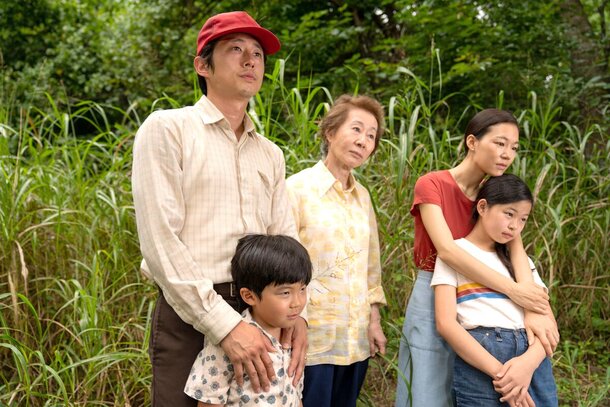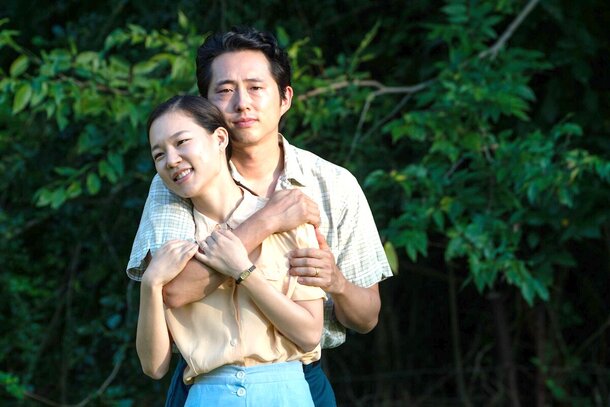There’s something magnetic about the smell of fresh soil and dreams in the air — and Minari captures that invisible essence with a quiet, pulsing intensity. From the first moment, I found myself pulled into a family’s tender yet deeply chaotic journey—not just across state lines, but into a cultural no man’s land where hope and hardship coexist like uneasy neighbors.
At first glance, Minari seems deceptively simple: a Korean-American family moves to rural Arkansas in the 1980s to start a farm. But oh, how quickly that illusion shatters. Underneath the surface is a story bubbling with quiet tension, unspoken fears, and the raw need to belong — anywhere, somehow. What surprised me most was not the plot itself, but how it breathes, how every moment unfolds with the weight of something unsaid, making the film feel alive and painfully intimate.
Plot Overview (Spoiler-Free)
Jacob Yi (Steven Yeun) dreams big — he uproots his family from California to a remote plot of Arkansas land, determined to grow Korean produce for fellow immigrants. But his wife Monica (Han Ye-ri) is less than thrilled with their new life in a trailer, isolated and uncertain. Their children, Anne and David, navigate both their parents’ conflict and their own culture shock. When Monica’s eccentric mother Soon-ja (Youn Yuh-jung) arrives from Korea, things get more unpredictable — and unexpectedly beautiful. The story becomes less about farming and more about what takes root: identity, resilience, and the complicated nature of the American dream.

Director’s Vision
Director Lee Isaac Chung crafts Minari from personal memory, but it feels like collective experience. His lens is gentle, even when the moments are brutal. The pacing is unhurried, letting us dwell in silences and witness small heartbreaks as if we’re standing in the same room. It’s a masterclass in restraint. Chung doesn't shout his message — he whispers it, and somehow that lands harder.
Performances That Linger
Steven Yeun, nominated for Best Actor at the Academy Awards, delivers a performance brimming with quiet desperation. He plays Jacob with such earnest stubbornness that you want to shake him—and hug him. But it’s Youn Yuh-jung who steals the film, earning an Oscar for Best Supporting Actress. Her portrayal of the unconventional grandmother is unlike any I’ve seen: vulgar, hilarious, tender, and fierce. She brings humor and truth in equal measure, reminding us that wisdom doesn’t always come wearing pearls and a smile.
Cinematography and Sound
The cinematography by Lachlan Milne (also known for Hunt for the Wilderpeople) is earthy and warm, full of golden fields and quiet moments that feel like they could shatter at any second. Emile Mosseri’s score is haunting yet delicate — like lullabies for a family barely holding it together. Every frame and sound amplifies the emotional tightrope this family walks.

Themes and Symbolism
At its core, Minari explores uprootedness—how we chase dreams, transplant traditions, and water our hopes in unfamiliar soil. The minari plant itself becomes a symbol of adaptability: an immigrant weed that thrives anywhere, growing wild in the most unexpected places. Faith, masculinity, generational tension, and cultural identity weave through every interaction.
Factual Details (Verified)
IMDb Rating: 7.4
Budget: Approx. $2 million
Academy Awards: 6 nominations, including Best Picture, Best Actor (Yeun), and Best Director; Winner of Best Supporting Actress (Youn Yuh-jung)
Other Honors: Grand Jury Prize & U.S. Dramatic Audience Award at Sundance Film Festival (All names, cast, and crew verified via IMDb)

Audience Reactions: USA vs. UK
In the USA, Minari resonated deeply with second-generation immigrants and indie film lovers. Many praised it as a refreshingly authentic portrayal of Korean-American life, elevating it to near-cult status in A24 circles. Audiences connected with its commentary on assimilation and sacrifice — topics deeply rooted in the American narrative.
In the UK, responses were slightly more subdued but still admiring. British viewers praised the film’s universality and poetic storytelling but were more divided on the pacing, with some finding its slow-burn approach “too delicate” compared to mainstream dramas. Still, critics across both regions agreed on one thing: Youn Yuh-jung was unforgettable.

Final Verdict
Minari isn't just a film. It's a feeling — one that creeps up on you quietly and then refuses to leave. It made me question how we define success, home, and love. Whether you're a child of immigrants, a parent with big dreams, or someone caught between two worlds, this film speaks to something primal. It's not loud, but it’s lasting.
Rating: 9/10
Pros: Masterful performances, moving score, nuanced storytelling
Cons: Pacing may test patience for some
Let this movie plant itself in your heart. It just might grow into something unforgettable.











